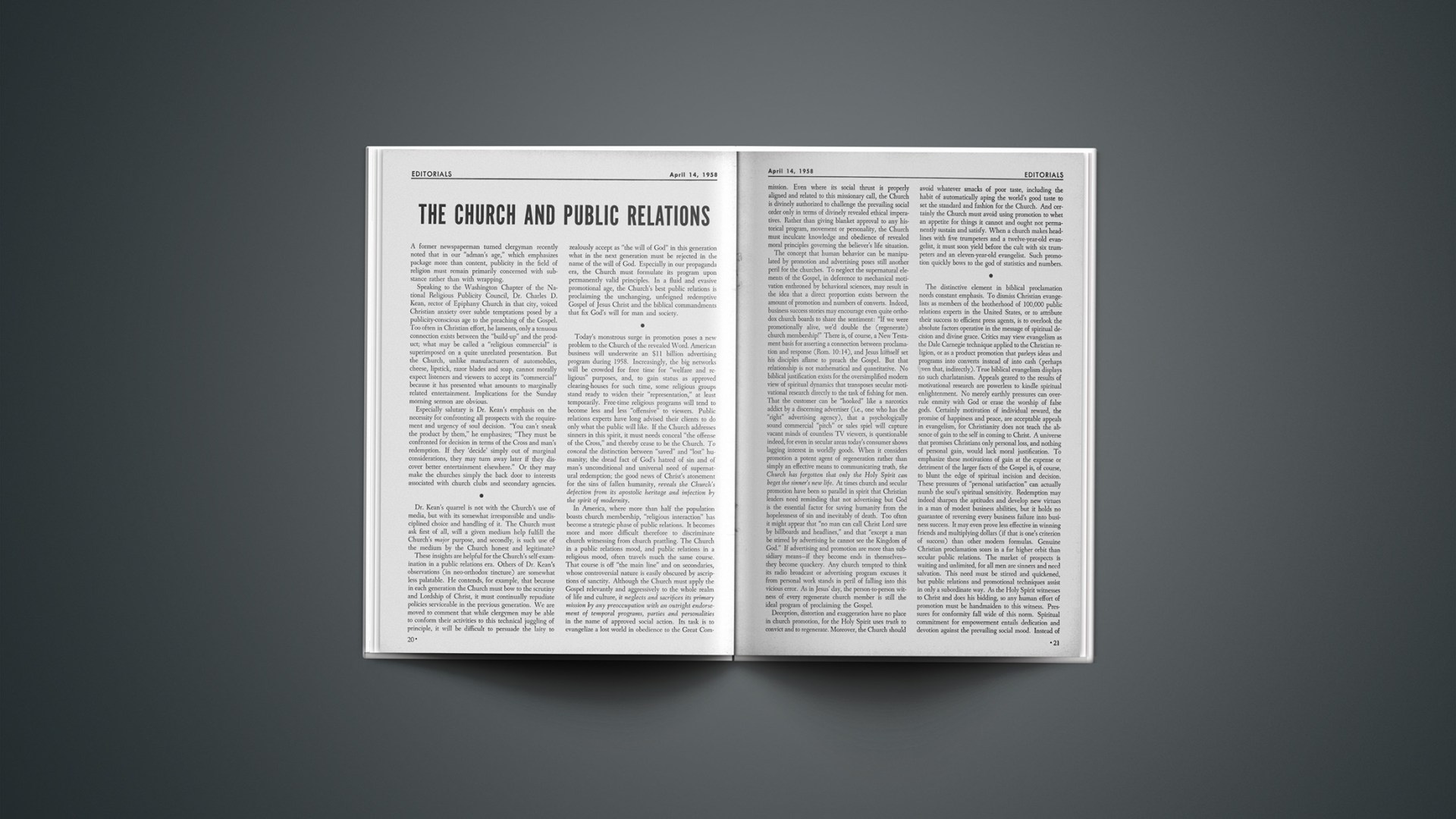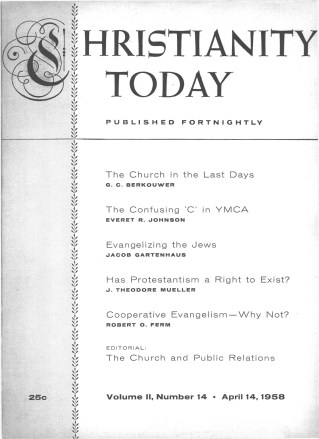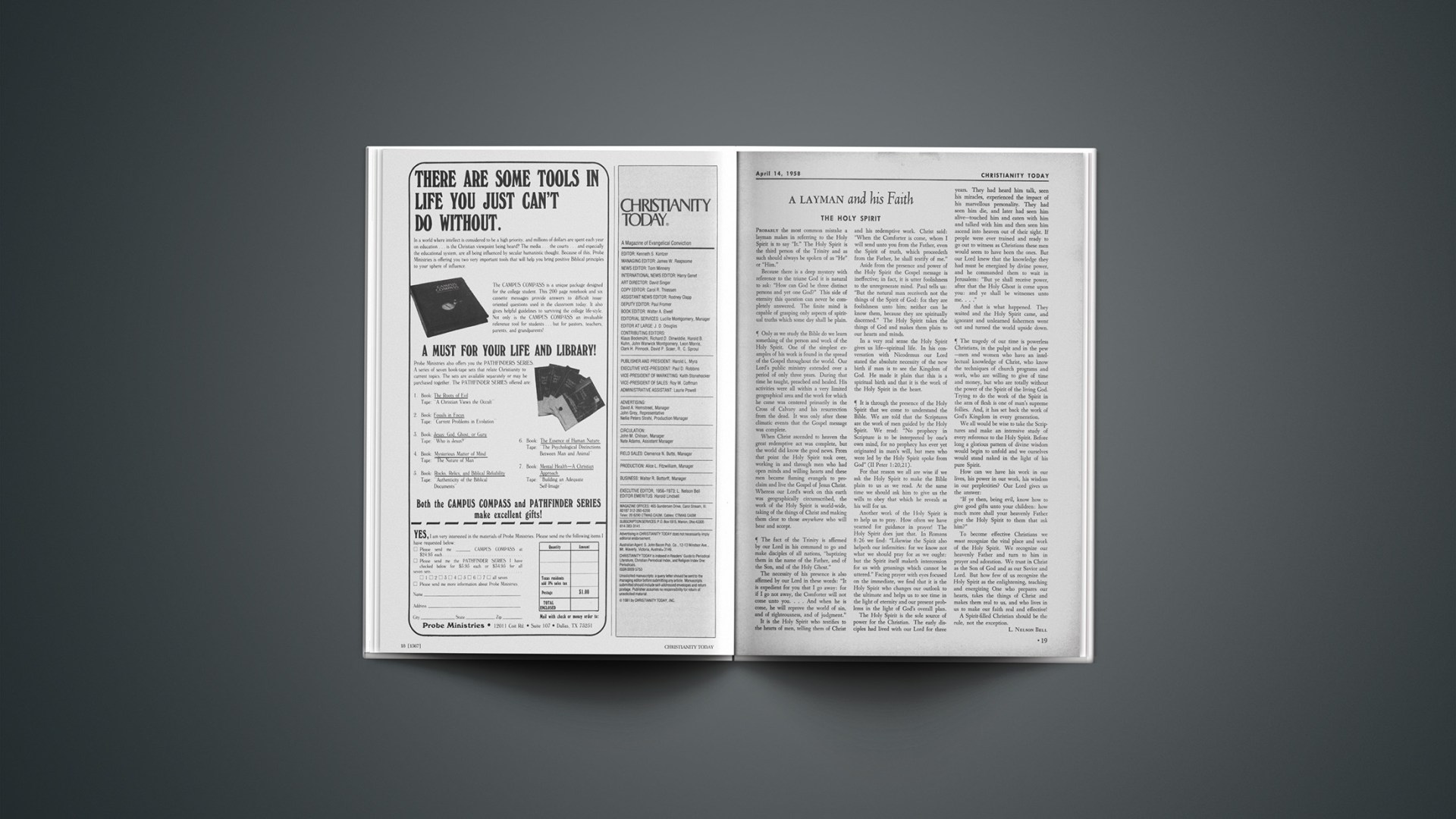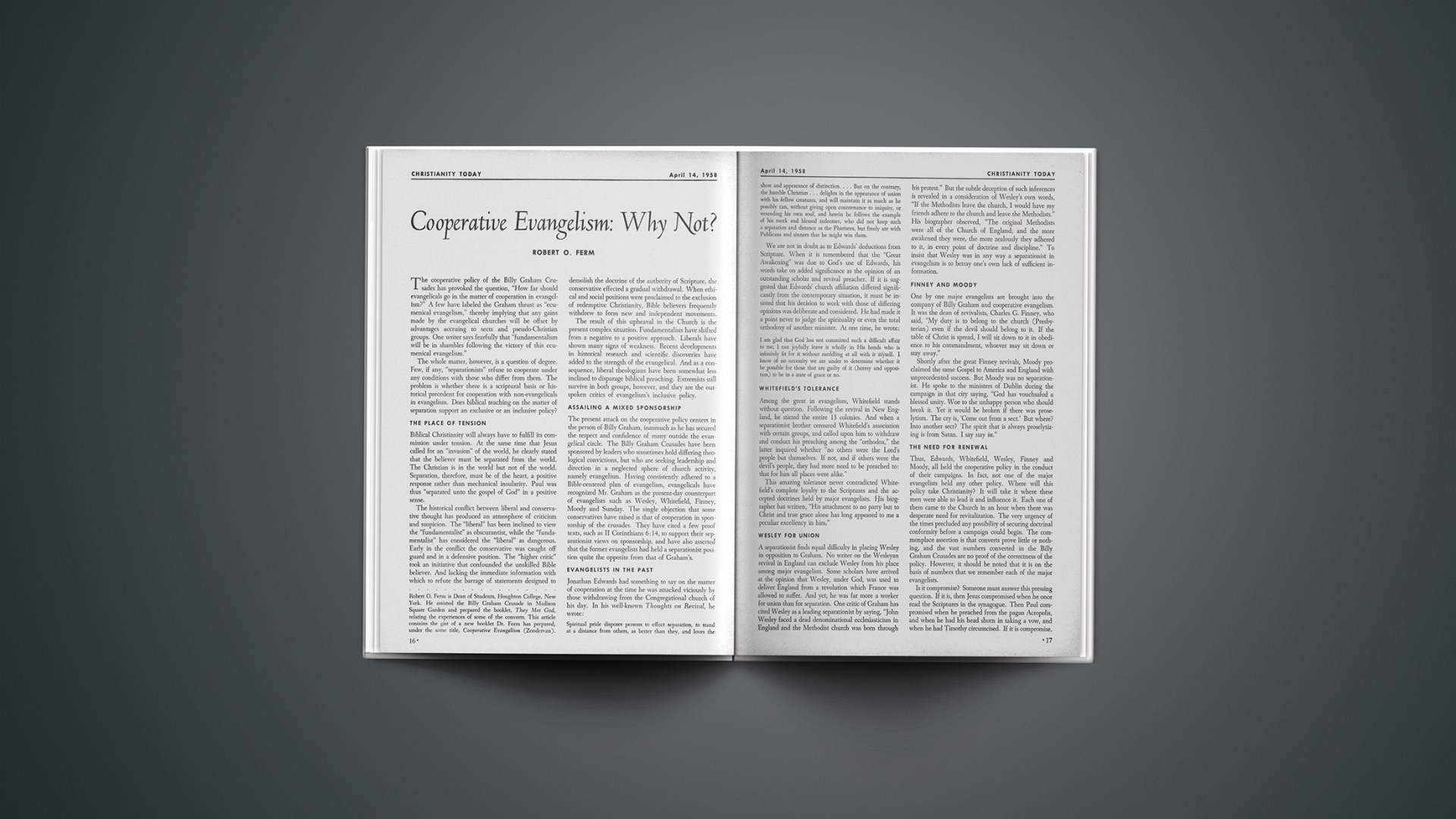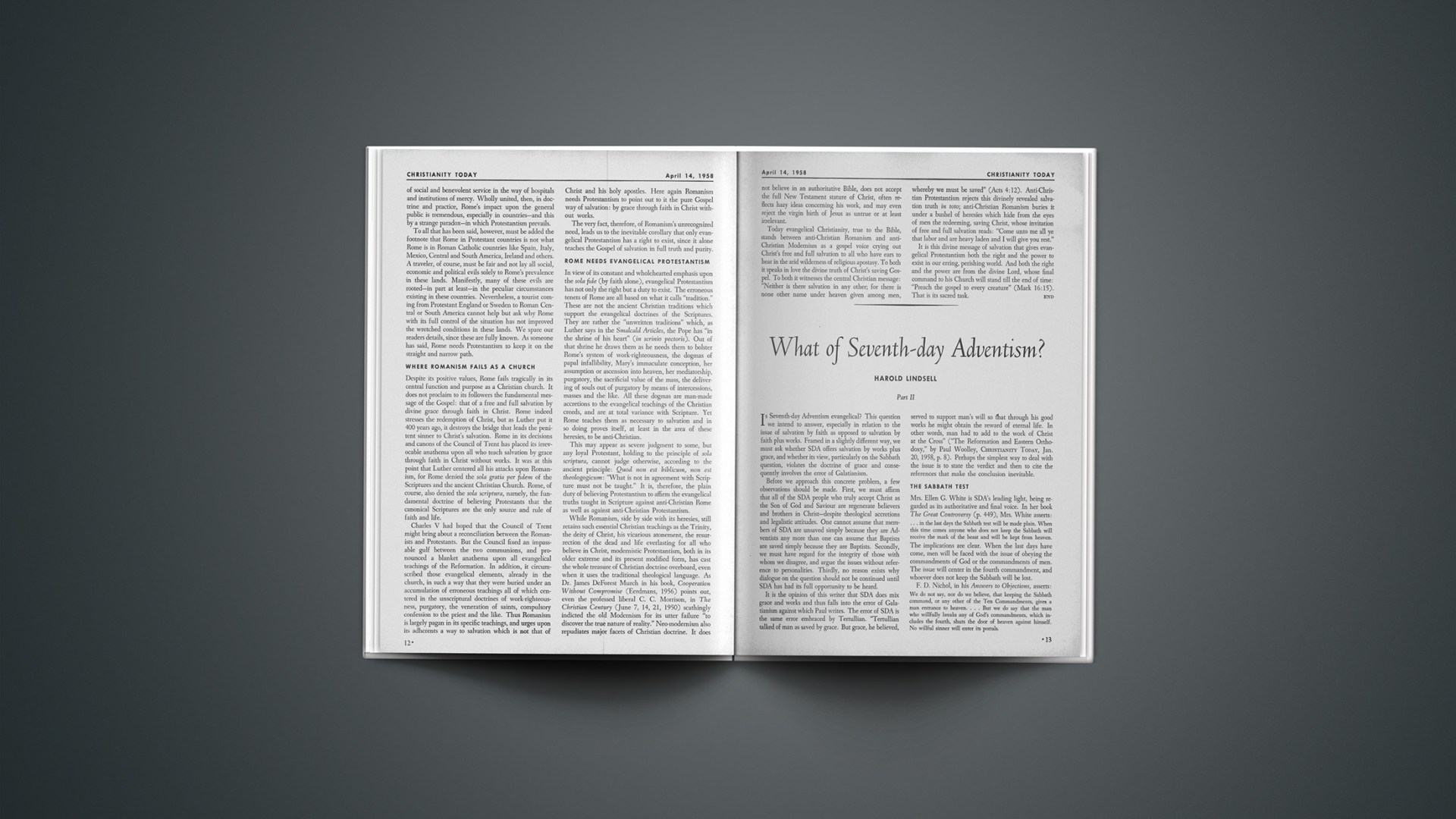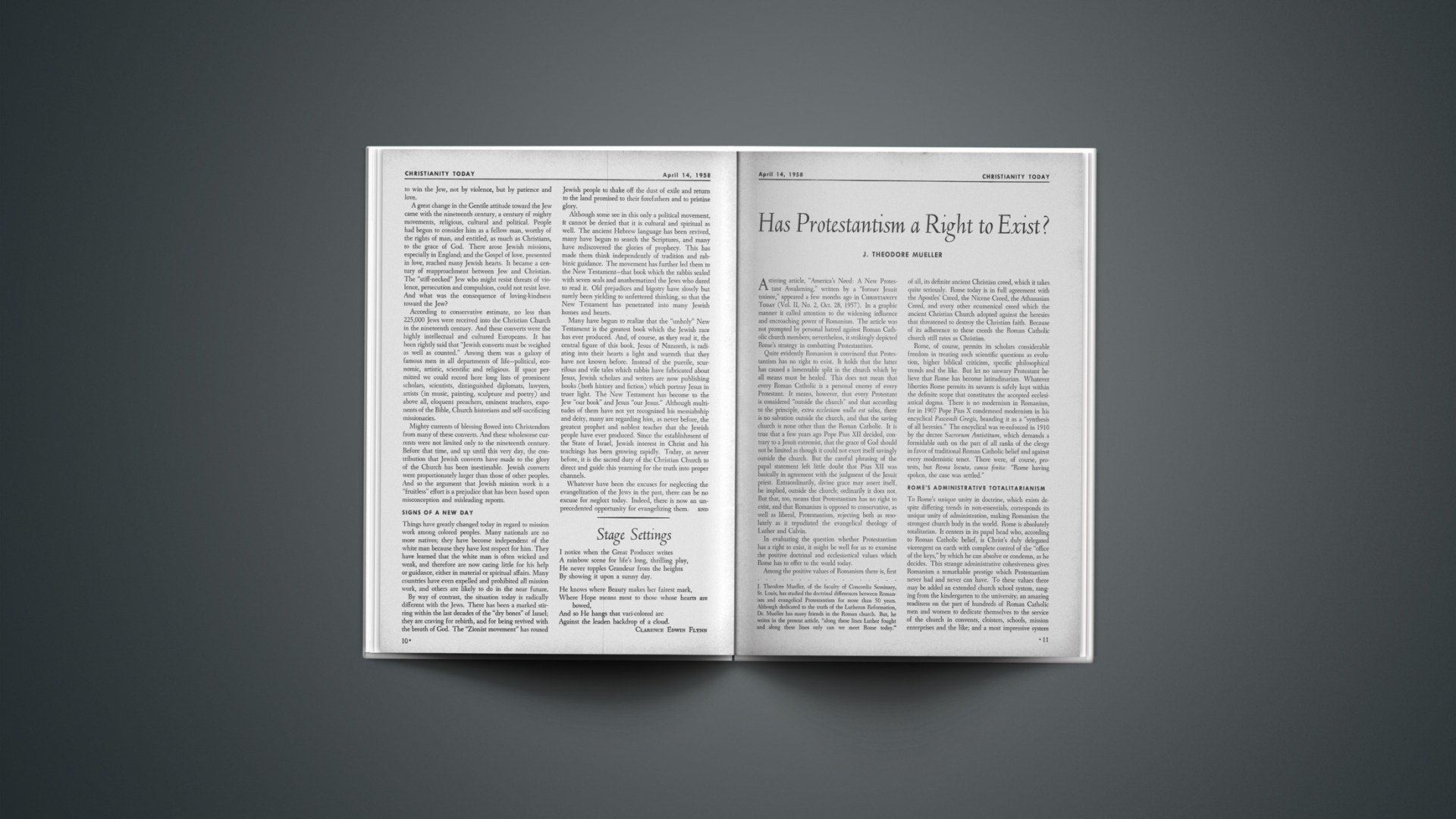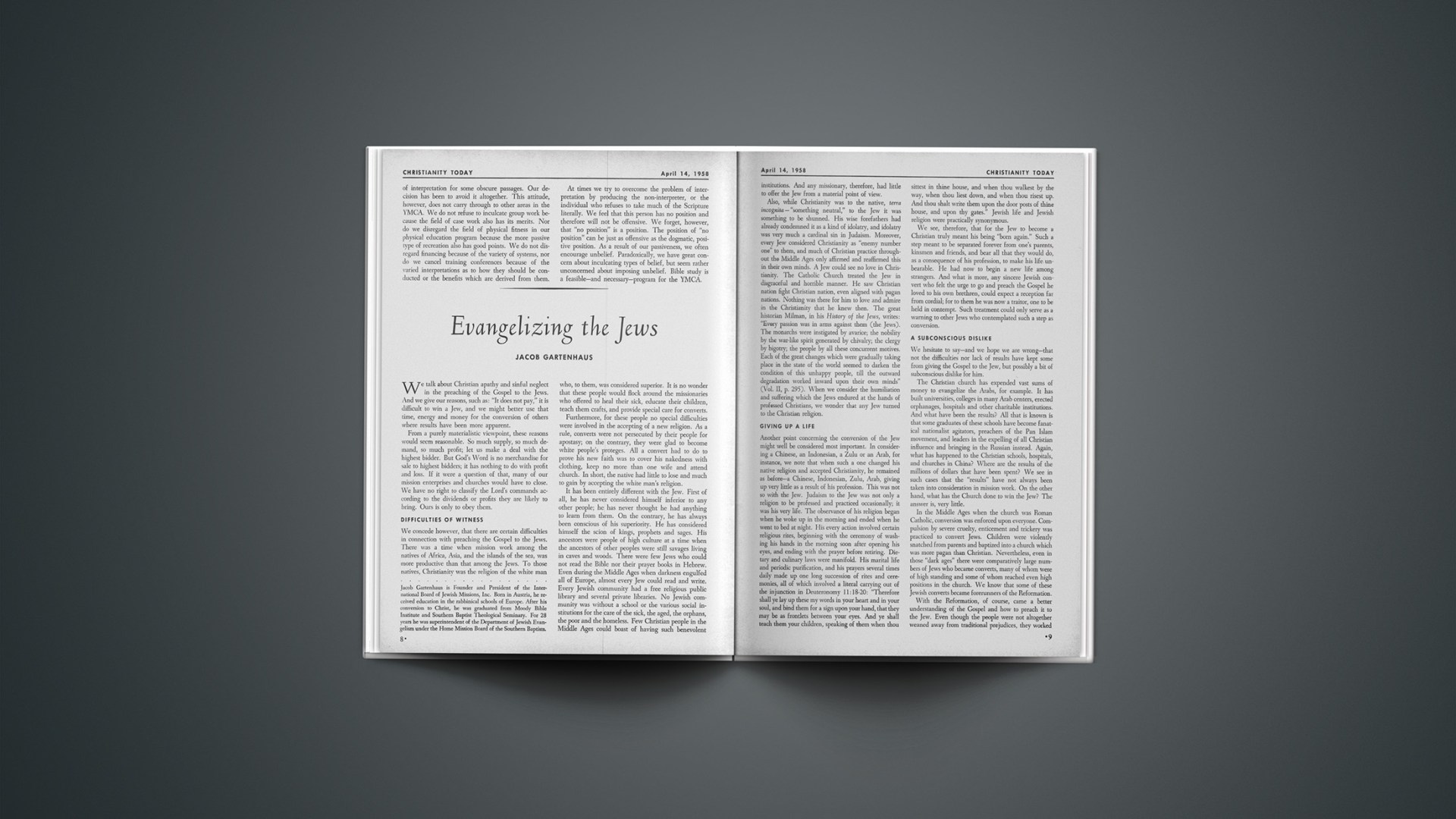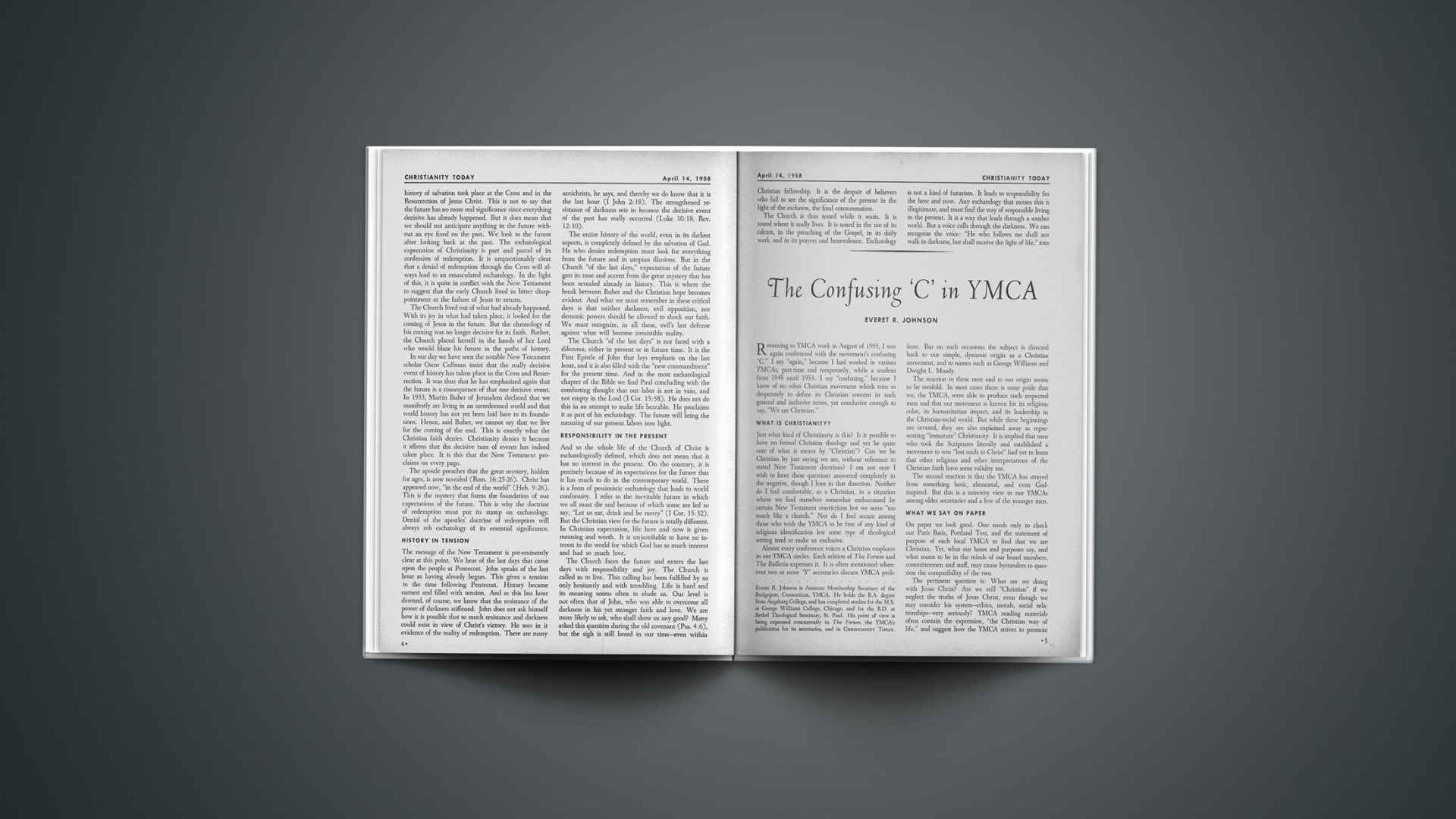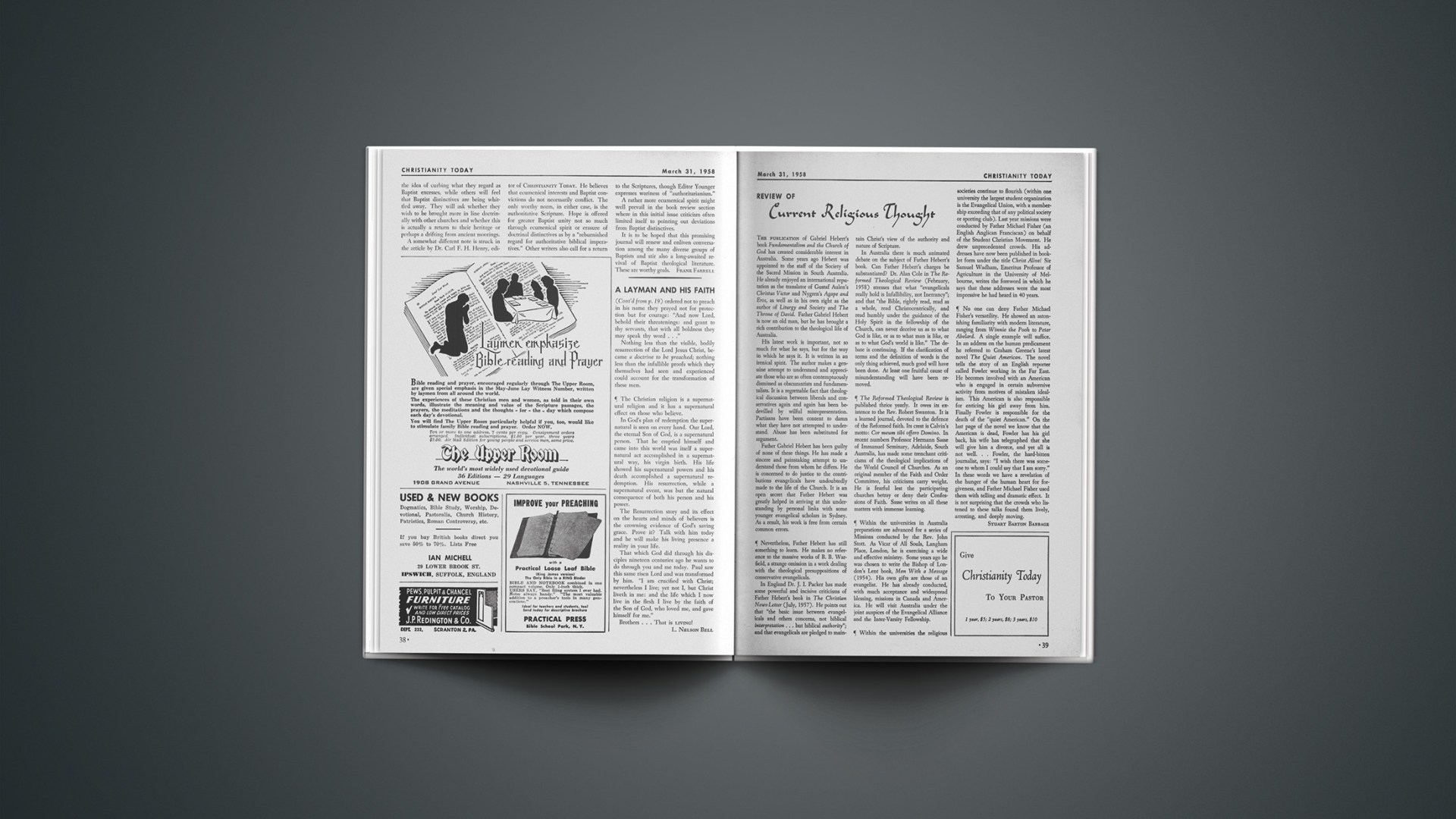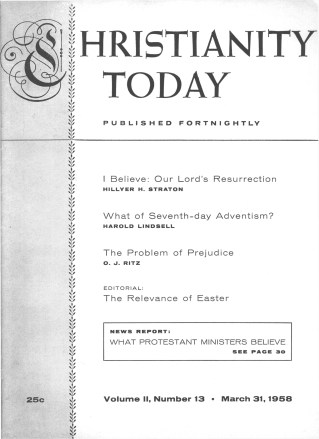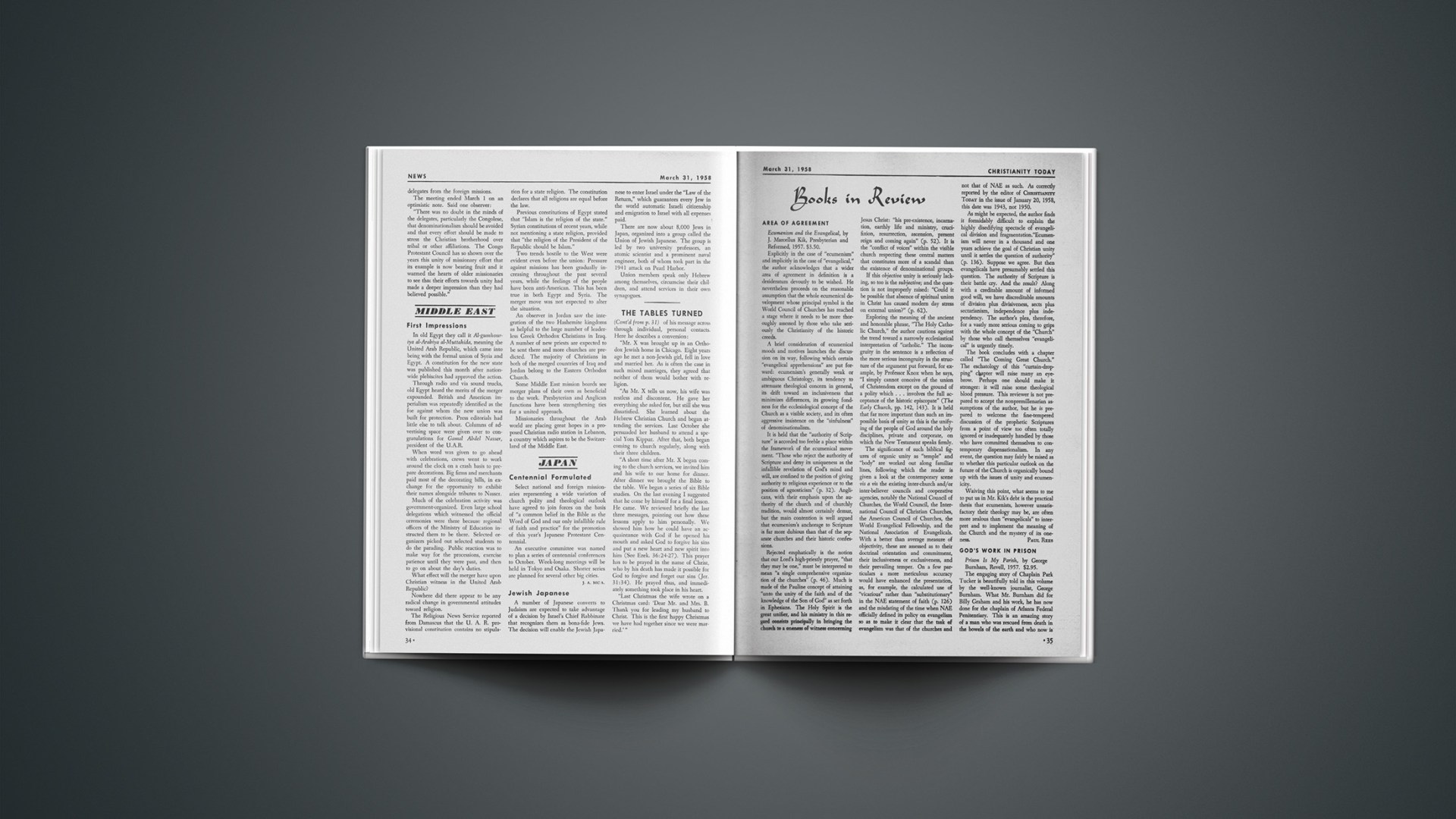A former newspaperman turned clergyman recently noted that in our “adman’s age,” which emphasizes package more than content, publicity in the field of religion must remain primarily concerned with substance rather than with wrapping.
Speaking to the Washington Chapter of the National Religious Publicity Council, Dr. Charles D. Kean, rector of Epiphany Church in that city, voiced Christian anxiety over subtle temptations posed by a publicity-conscious age to the preaching of the Gospel. Too often in Christian effort, he laments, only a tenuous connection exists between the “build-up” and the product; what may be called a “religious commercial” is superimposed on a quite unrelated presentation. But the Church, unlike manufacturers of automobiles, cheese, lipstick, razor blades and soap, cannot morally expect listeners and viewers to accept its “commercial” because it has presented what amounts to marginally related entertainment. Implications for the Sunday morning sermon are obvious.
Especially salutary is Dr. Kean’s emphasis on the necessity for confronting all prospects with the requirement and urgency of soul decision. “You can’t sneak the product by them,” he emphasizes; “They must be confronted for decision in terms of the Cross and man’s redemption. If they ‘decide’ simply out of marginal considerations, they may turn away later if they discover better entertainment elsewhere.” Or they may make the churches simply the back door to interests associated with church clubs and secondary agencies.
Dr. Kean’s quarrel is not with the Church’s use of media, but with its somewhat irresponsible and undisciplined choice and handling of it. The Church must ask first of all, will a given medium help fulfill the Church’s major purpose, and secondly, is such use of the medium by the Church honest and legitimate?
These insights are helpful for the Church’s self-examination in a public relations era. Others of Dr. Kean’s observations (in neo-orthodox tincture) are somewhat less palatable. He contends, for example, that because in each generation the Church must bow to the scrutiny and Lordship of Christ, it must continually repudiate policies serviceable in the previous generation. We are moved to comment that while clergymen may be able to conform their activities to this technical juggling of principle, it will be difficult to persuade the laity to zealously accept as “the will of God” in this generation what in the next generation must be rejected in the name of the will of God. Especially in our propaganda era, the Church must formulate its program upon permanently valid principles. In a fluid and evasive promotional age, the Church’s best public relations is proclaiming the unchanging, unfeigned redemptive Gospel of Jesus Christ and the biblical commandments that fix God’s will for man and society.
Today’s monstrous surge in promotion poses a new problem to the Church of the revealed Word. American business will underwrite an $11 billion advertising program during 1958. Increasingly, the big networks will be crowded for free time for “welfare and religious” purposes, and, to gain status as approved clearing-houses for such time, some religious groups stand ready to widen their “representation,” at least temporarily. Free-time religious programs will tend to become less and less “offensive” to viewers. Public relations experts have long advised their clients to do only what the public will like. If the Church addresses sinners in this spirit, it must needs conceal “the offense of the Cross,” and thereby cease to be the Church. To conceal the distinction between “saved” and “lost” humanity; the dread fact of God’s hatred of sin and of man’s unconditional and universal need of supernatural redemption; the good news of Christ’s atonement for the sins of fallen humanity, reveals the Church’s defection from its apostolic heritage and infection by the spirit of modernity.
In America, where more than half the population boasts church membership, “religious interaction” has become a strategic phase of public relations. It becomes more and more difficult therefore to discriminate church witnessing from church prattling. The Church in a public relations mood, and public relations in a religious mood, often travels much the same course. That course is off “the main line” and on secondaries, whose controversial nature is easily obscured by ascriptions of sanctity. Although the Church must apply the Gospel relevantly and aggressively to the whole realm of life and culture, it neglects and sacrifices its primary mission by any preoccupation with an outright endorsement of temporal programs, parties and personalities in the name of approved social action. Its task is to evangelize a lost world in obedience to the Great Commission. mission. Even where its social thrust is properly aligned and related to this missionary call, the Church is divinely authorized to challenge the prevailing social order only in terms of divinely revealed ethical imperatives. Rather than giving blanket approval to any historical program, movement or personality, the Church must inculcate knowledge and obedience of revealed moral principles governing the believer’s life situation.
The concept that human behavior can be manipulated by promotion and advertising poses still another peril for the churches. To neglect the supernatural elements of the Gospel, in deference to mechanical motivation enthroned by behavioral sciences, may result in the idea that a direct proportion exists between the amount of promotion and numbers of converts. Indeed, business success stories may encourage even quite orthodox church boards to share the sentiment: “If we were promotionally alive, we’d double the (regenerate) church membership!” There is, of course, a New Testament basis for asserting a connection between proclamation and response (Rom. 10:14), and Jesus himself set his disciples aflame to preach the Gospel. But that relationship is not mathematical and quantitative. No biblical justification exists for the oversimplified modern view of spiritual dynamics that transposes secular motivational research directly to the task of fishing for men. That the customer can be “hooked” like a narcotics addict by a discerning advertiser (i.e., one who has the “right” advertising agency), that a psychologically sound commercial “pitch” or sales spiel will capture vacant minds of countless TV viewers, is questionable indeed, for even in secular areas today’s consumer shows lagging interest in worldly goods. When it considers promotion a potent agent of regeneration rather than simply an effective means to communicating truth, the Church has forgotten that only the Holy Spirit can beget the sinner’s new life. At times church and secular promotion have been so parallel in spirit that Christian leaders need reminding that not advertising but God is the essential factor for saving humanity from the hopelessness of sin and inevitably of death. Too often it might appear that “no man can call Christ Lord save by billboards and headlines,” and that “except a man be stirred by advertising he cannot see the Kingdom of God.” If advertising and promotion are more than subsidiary means—if they become ends in themselves—they become quackery. Any church tempted to think its radio broadcast or advertising program excuses it from personal work stands in peril of falling into this vicious error. As in Jesus’ day, the person-to-person witness of every regenerate church member is still the ideal program of proclaiming the Gospel.
Deception, distortion and exaggeration have no place in church promotion, for the Holy Spirit uses truth to convict and to regenerate. Moreover, the Church should avoid whatever smacks of poor taste, including the habit of automatically aping the world’s good taste to set the standard and fashion for the Church. And certainly the Church must avoid using promotion to whet an appetite for things it cannot and ought not permanently sustain and satisfy. When a church makes headlines with five trumpeters and a twelve-year-old evangelist, it must soon yield before the cult with six trumpeters and an eleven-year-old evangelist. Such promotion quickly bows to the god of statistics and numbers.
The distinctive element in biblical proclamation needs constant emphasis. To dismiss Christian evangelists as members of the brotherhood of 100,000 public relations experts in the United States, or to attribute their success to efficient press agents, is to overlook the absolute factors operative in the message of spiritual decision and divine grace. Critics may view evangelism as the Dale Carnegie technique applied to the Christian religion, or as a product promotion that parleys ideas and programs into converts instead of into cash (perhaps even that, indirectly). True biblical evangelism displays no such charlatanism. Appeals geared to the results of motivational research are powerless to kindle spiritual enlightenment. No merely earthly pressures can overrule enmity with God or erase the worship of false gods. Certainly motivation of individual reward, the promise of happiness and peace, are acceptable appeals in evangelism, for Christianity does not teach the absence of gain to the self in coming to Christ. A universe that promises Christians only personal loss, and nothing of personal gain, would lack moral justification. To emphasize these motivations of gain at the expense or detriment of the larger facts of the Gospel is, of course, to blunt the edge of spiritual incision and decision. These pressures of “personal satisfaction” can actually numb the soul’s spiritual sensitivity. Redemption may indeed sharpen the aptitudes and develop new virtues in a man of modest business abilities, but it holds no guarantee of reversing every business failure into business success. It may even prove less effective in winning friends and multiplying dollars (if that is one’s criterion of success) than other modern formulas. Genuine Christian proclamation soars in a far higher orbit than secular public relations. The market of prospects is waiting and unlimited, for all men are sinners and need salvation. This need must be stirred and quickened, but public relations and promotional techniques assist in only a subordinate way. As the Holy Spirit witnesses to Christ and does his bidding, so any human effort of promotion must be handmaiden to this witness. Pressures for conformity fall wide of this norm. Spiritual commitment for empowerment entails dedication and devotion against the prevailing social mood. Instead of merging and submerging the individual into the crowd, the Gospel singles him out and sharpens the awesome uniqueness of his personal decision and eternal destiny. The Church that uses pressures of conformity or motives of personal gain to mass-produce Christians obscures the radical decision the Gospel demands.
Propaganda is a means of power over today’s multitudes. Therefore the Church must analyze and appropriate its components under the direction and Lordship of Christ. Simply to snub or dismiss public relations is incalculably costly in loss of opportunity for the Church. It is familiar enough that the secular West has seized propaganda as an instrument of commercial exploitation to set the affections of the masses on material things capable of becoming idols through inordinate desire. Furthermore, public relations experts have served big business in psychologically demolishing many causes dear to the hearts of churchgoers. The distilleries employed press agents to promote repeal of the Eighteenth Amendment. Promoters of professional sports and amusements used similar techniques to neutralize the Lord’s Day Alliance. By stressing benevolence contributions and tax utility to create public sympathy, horse racing and gambling interests legalized pari-mutuel betting. But this is not all, nor the worst. An even more brazen assault upon conscience and Christian morality threatens the Western world. In Communism, propaganda is dedicated to the service of antichrist. It aims to eradicate all contemporary alternatives and foes to naturalism, relativism and atheism. Propaganda is no toy. It is more like nuclear power in the atomic age. Unless the Church superintends the release of words to reveal the authority of the Word, propaganda will destroy the Word not on a cross but by the demonic manipulation of nouns, verbs and adjectives. To specialize in words, but not in the Word Incarnate and in the Word Written, constitutes a Church powerless to fire men for Christ and to insulate them against anti-Christ.
Charges And Counter-Charges Over Colombian Persecutions
By a major propaganda effort the Roman Catholic press is trying to discredit complaints of religious persecution of Protestant missionaries and believers in Colombia. After visiting South America, spokesmen for the hierarchy have publicly repudiated such charges. The National Catholic Welfare Conference has issued denials to the newspapers, and Roman Catholic publications similarly have branded the Protestant complaints false.
In its issue of March 8 the Jesuit weekly America takes a further step. It editorializes that “the impact of recent Protestant ‘missionary’ activities in Colombia is seriously jeopardizing U. S.-Colombian relations.” This thrust is no surprise to those aware of Vatican diplomatic strategy. Protestant missionaries have long been opposed as an unsettling force in predominantly Catholic countries.
No amount of half-truths will smother the facts in Colombia, however. When NCWC’s Father Kelly brushed aside the documented protests of Colombia’s Evangelical Confederation, the National Association of Evangelicals in America offered to open its files publicly to newspaper editors.
In an article on “Colombia and U.S. ‘Missionaries,’ ” America’s managing editor Father Eugene K. Culhane asserts that Colombians “resent the campaign of slander carried on in the U. S. press in the past eight years, presenting Colombia as a nation of religious bigots.” Father Culhane’s criticism of the American press is clearly a case of offering adjectives on the wrong altar.
The article, moreover, criticizes American diplomats actively seeking to end the religious persecutions and to guarantee Protestants a measure of tolerance and protection. Father Culhane writes that Colombians “resent … the activities of U. S. citizens and agencies—sometimes, they suspect, even of U. S. government officials—toward furthering the spread of Protestantism in Colombia.” But religious freedom remains an American ideal of legitimate concern to American statesmen. When foreign lands enter reciprocal treaties that assure religious tolerance, treaty conditions should be honored despite the intolerance of an ecclesiastical hierarchy.
The paragraphs of Father Culhane’s article bristle with Roman Catholic disdain for Protestants. He points out that early Colombian treaties with England, Holland and the United States allow “non-Catholic cults” exercises (Father Culhane inexcusably appends the word only, actually not found in the treaties) “only ‘in private houses, churches, chapels or places of worship.’ ” Furthermore, they prohibit open propaganda in the streets and in other media of mass communication. Father Culhane quotes the directive issued in 1954 by the Ministry of Government: “Non-Catholic nationals or foreigners resident in Colombia, whether ministers, pastors or simple faithful, may not proselytize in public, nor use means of propaganda, outside the locale where the cult takes place.” “If Protestants would observe that ruling,” the Jesuit editor comments, “religious tensions in Colombia would disappear almost overnight.” And, we might add, so also would Protestantism as a public evangelistic force.
Noteworthy is the reason for Catholic attitudes in Colombia given by the managing editor of America. Restrictions on public proclamation of the Gospel by Protestants is proper, implies Father Culhane, because Roman Catholicism is “the faith professed by the quasitotality of her [Colombia’s] people.” Should Romanism gain a decisive majority in the United States, what are the implications for religious freedom in our erstwhile Protestant country?

